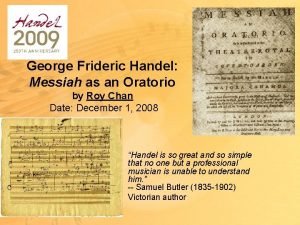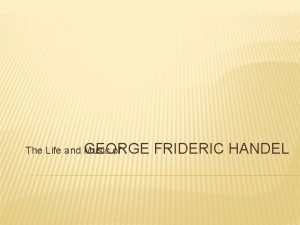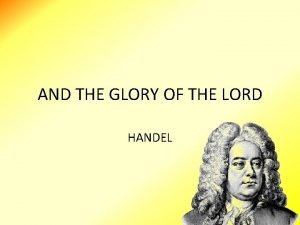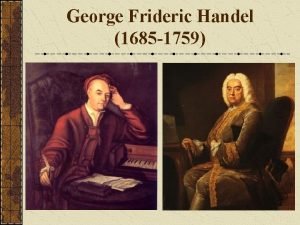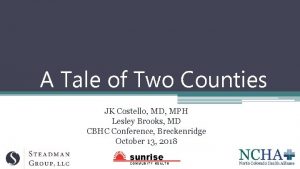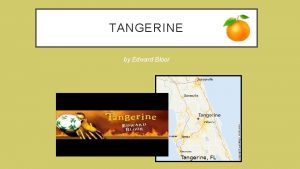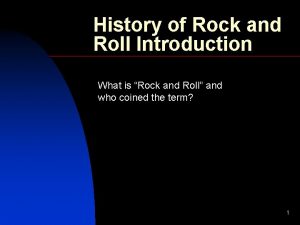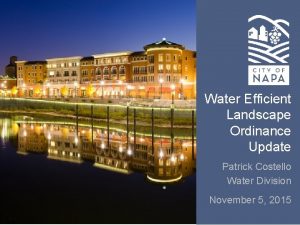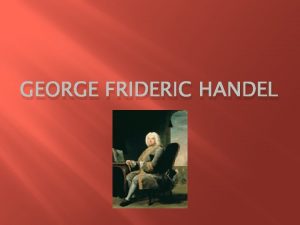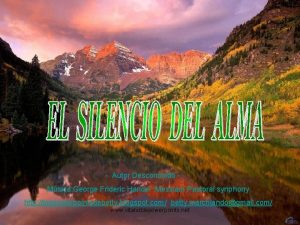George Frideric Handel Zach Costello His Life Handel









- Slides: 9

George Frideric Handel Zach Costello

His Life • Handel was born on February 23, 1685, in Halle, Germany. • . He was the only one in his family with a musical background. • His father was a business man, and pressured Handel to be a lawyer.

His Life • By around 1706, he decided to leave and work independently in Italy. There he composed many works for churches, and other places of worship. • Four years later, he moved back north to the Alps, and became the Kapellmeister (person who is in charge of making music) to the German Prince George, the Elector of Hanover. • Handel also made the decision to live permanently in London, England, in 1710. Here, he premiered his opera Rinaldo in 1711.

His Life • Just a few years later, since he had so much publicity, and fantastic works, he was asked to be the music director of the Royal Academy of Music (a new company that was for making Italian operas on the London stages) • In his later life, Handel composed some of his most important pieces, and most popular ones as well, such as Music for the Royal Fireworks piece, that is still known today.

Later life and Death • Handel was in a serious carriage accident in 1750 on his journey back to Germany from London. A year later, one of his eyes began to fail. As it appears, his life was dwindling, and eight years later he died in his home on Brook Street, at age 74. His very last performance he attended was of his own Messiah. Handel never had the opportunity to fall in love, or get married in his life.

• Handel’s Messiah was his most popular piece out of all of his 29 oratorios. This piece is mostly known to the modern world during Christmas, or in the Christmas season. It is referred to as one of the “best known and most frequently performed choral works in Western music. ” (Paul Myers “Handel’s Messiah”) • The Messiah was composed in 1741, and first performed in 1742 in Dublin, Ireland. He later was asked to perform Messiah at the Foundling Hospital for a benefit concert. It was so successful, that he was asked to perform the piece annually for a part of his life.

Messiah • The main parts of this song are to praise Jesus Christ, his life and death, and the whole nativity scene that is displayed around Christmas. This piece was originally made as an Easter offering, yet it blew up into a fantastic piece for all people to hear. • Handel played the work many times throughout his life, although it was just his later life. It was also the last performance he attended before his death. It is even performed to this day by symphonies and choirs around the world. There are three distinct sections that this piece is separated into. It begins in E minor in the first section. The whole piece tells a story of Christ’s life.

Messiah • It is rare for anyone to ever recreate it even similarly to how it was when it first came out. The most alike performance in modern day is the scored form the early 1750’s. The modern performances that are rare and fairly similar date back to around Handel’s life. This piece is still a piece that can connect with everyone, and is familiar to most people. • Handel was a master when it came to composing choral pieces as well as operas. His music was very popular to the bourgeois class, who were the upper and more sophisticated people in the eighteenth century. The Messiah was an oratorio which is a composition that involves an orchestra, a choir, and an optional soloist. They were cheaper and easier to stage and perform. This made it so that his music was not only accessible by the higher classes, but also by middle class families. It gave his music a large audience, and an opportunity to connect with everyone.

Messiah’s Text • “Comfort ye, comfort ye my people. Every valley shall be exalted. And the glory, the glory of the Lord. Thus saith the Lord, the Lord of Hosts. Behold, I will send my messenger, But who may abide the day of His coming And He shall purify Behold, a virgin shall conceive. O thou that tellest good tidings to Zion Arise, shine For behold, darkness shall cover the earth The people that walked in darkness For unto us a Child is born There were shepherds abiding in the field And lo, the angel of the Lord came upon them And the angel said unto them And suddenly there was with the angel Glory to God in the highest Rejoice greatly, O daughter of Zion Then shall the eyes of the blind open'd He shall feed His flock like a shepherd Come unto Him, all ye that labour His yoke is easy, His burthen is light Behold the Lamb of God He was despised He gave his back to his smiters Surely, He hath borne our griefs and carried our sorrows And with His stripes we are healed All we like sheep, have gone astray All they that see Him, laugh Him to scorn He trusted in God Thy rebuke hath broken His hear Behold, and see if there be any sorrow He was cut off out of the land of the living But Thou didst not leave his soul in hell Lift up your heads Unto which of the angels said he at all-time Let all the angels of God worship Him Thou art gone up on high The Lord gave the word How beautiful are the feet of Him Their sound is gone out into all lands Why do the nations so furiously rage together Let us break their bonds asunder He that dwelleth in heaven Thou shalt break them with a rod of iron. Hallelujah I know that my Redeemer liveth Since by man came death Behold, I tell you a mystery The trumpet shall sound and the dead shall be rais'd Then shall be brought to pass O death, where is thy sting? But thanks be to God If God be for us, who can be against us Worthy is the Lamb that was slain AMEN. ”
